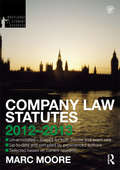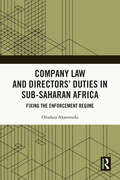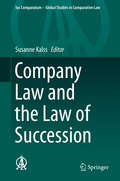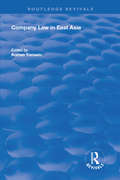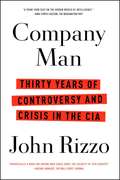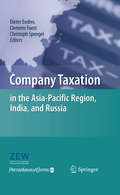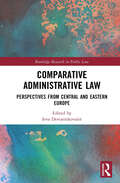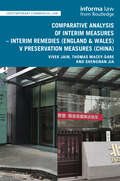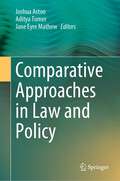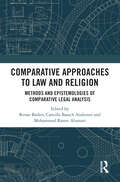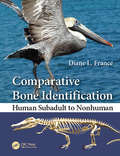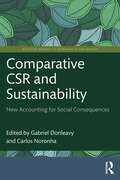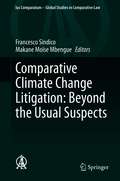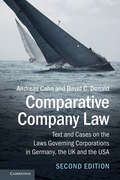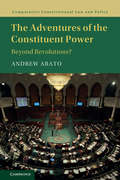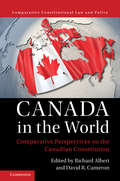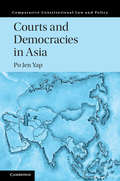- Table View
- List View
Company Law Statutes 2012-2013 (Routledge Student Statutes)
by Marc Moore‘Focused content, layout and price - Routledge competes and wins in relation to all of these factors’ - Craig Lind, University of Sussex, UK ‘The best value and best format books on the market.’ - Ed Bates, Southampton University, UK Routledge Student Statutes present all the legislation students need in one easy-to-use volume. Developed in response to feedback from lecturers and students, this book offers a fully up-to-date, comprehensive, and clearly presented collection of legislation - ideal for LLB and GDL course and exam use. Routledge Student Statutes are: • Exam Friendly: un-annotated and conforming to exam regulations • Tailored to fit your course: 80% of lecturers we surveyed agree that Routledge Student Statutes match their course and cover the relevant legislation • Trustworthy: Routledge Student Statutes are compiled by subject experts, updated annually and have been developed to meet student needs through extensive market research • Easy to use: a clear text design, comprehensive table of contents, multiple indexes and highlighted amendments to the law make these books the most student-friendly Statutes on the market Competitively Priced: Routledge Student Statutes offer content and usability rated as good or better than our major competitor, but at a more competitive price • Supported by a Companion Website: presenting scenario questions for interpreting Statutes, annotated web links, and multiple-choice questions, these resources are designed to help students to be confident and prepared.
Company Law and Directors’ Duties in Sub-Saharan Africa: Fixing the Enforcement Regime (Routledge Studies on Law in Africa)
by Oludara AkanmiduThis book provides a critical analysis of the enforcement regime for breach of directors’ duties in sub-Saharan Africa. Focusing on Nigeria, Kenya, Ghana, and Tanzania, it interrogates the current ‘state of play’ regarding the enforcement of directors’ duties in sub-Saharan African countries.The book examines the effectiveness of enforcement, the reasons for its successes or failures and how it might be improved in these countries. Finally, taking into consideration the specific socio-cultural context of the countries in question, it offers persuasive and practical avenues for reform.This book will be of interest to scholars and practitioners of comparative corporate law and corporate governance in Africa.
Company Law and Sustainability
by Sjåfjell, Beate and Richardson, Benjamin J. Beate Sjåfjell Benjamin J. RichardsonThis investigation of the barriers to and opportunities for promoting environmental sustainability in company law provides an in-depth comparative analysis of company law regimes across the world. The social norm of shareholder primacy is the greatest barrier preventing progress, and it also helps explain why voluntary action by companies and investors is insufficient. By deconstructing the myth that shareholder primacy has a legal basis and challenging the economic postulates on which mainstream corporate governance debate is based, Company Law and Sustainability reveals a surprisingly large unexplored potential within current company law regimes for companies to reorient themselves towards sustainability. It also suggests possible methods of reforming the existing legal infrastructure for companies and provides an important contribution to the broader debate on how to achieve sustainability.
Company Law and the Law of Succession (Ius Comparatum - Global Studies in Comparative Law #5)
by Susanne KalssThis book is one of the first to link company law to the law of succession by concentrating on family businesses. It shows that, to understand the legal framework underlying the daily operations of family businesses, one needs legal analysis, empirical data, psychological and sociological knowledge. The book works on the premise that, since many businesses have been founded by families, practitioners need to develop an understanding of the legal background of such businesses and build up experience to be able to create contracts, trusts, foundations and other legal mechanisms to give shape to systems and procedures for the transfer of shares and control within the family. Comparing the national legal order, techniques, and mechanisms in a range of countries, the book examines parallel developments in these fields of law across the world. Finally, it demonstrates the room for companies, shareholders and the members of a family to develop individual solutions within the legal framework for transferring businesses and shares to the next generation.
Company Law in East Asia (Routledge Revivals)
by Roman TomasicFirst published in 1999, this volume provides an overview of company laws in South East Asia, North East Asia and the Pacific. The chapters adopt a standard format to allow for comparisons to be made as well as highlighting key features of company laws in each jurisdiction. The contributors are experts in their fields and present practical and policy related insights. The book also contains some useful overviews of company law themes in Asia.
Company Lawcards 2012-2013 (Lawcards)
by RoutledgeRoutledge Lawcards are your complete, pocket-sized guides to key examinable areas of the undergraduate law curriculum and the CPE/GDL. Their concise text, user-friendly layout and compact format make them an ideal revision aid. Helping you to identify, understand and commit to memory the salient points of each area of the law, shouldn’t you make Routledge Lawcards your essential revision companions? Fully updated and revised with all the most important recent legal developments, Routledge Lawcards are packed with features: Revision checklists help you to consolidate the key issues within each topic Colour coded highlighting really makes cases and legislation stand out Full tables of cases and legislation make for easy reference Boxed case notes pick out the cases that are most likely to come up in exams Diagrams and flowcharts clarify and condense complex and important topics '...an excellent starting point for any enthusiastic reviser. The books are concise and get right down to the nitty-gritty of each topic.' - Lex Magazine Routledge Lawcards are supported by a Companion Website offering: Flashcard glossaries allowing you to test your understanding of key terms and definitions Multiple Choice Questions to test and consolidate your revision of each chapter Advice and tips to help you better plan your revision and prepare for your exams Titles in the Series: Commercial Law; Company Law; Constitutional Law; Contract Law; Criminal Law; Employment Law; English Legal System; European Union Law; Evidence; Equity and Trusts; Family Law; Human Rights; Intellectual Property Law; Jurisprudence; Land Law; Tort Law
Company Man: Thirty Years of Controversy and Crisis in the CIA
by John RizzoThe “revealing” (The New Yorker) insider history of the CIA from a lawyer with a “front-row seat on the hidden world of intelligence” (The Washington Post). Former CIA director George J. Tenet called Company Man a “must read.”Over the course of a thirty-four-year (1976-2009) career, John Rizzo served under eleven CIA directors and seven presidents, ultimately becoming a controversial public figure and a symbol and victim of the toxic winds swirling in post-9/11 Washington. In Company Man, Rizzo charts the CIA’s evolution from shadowy entity to an organization exposed to new laws, rules, and a seemingly never-ending string of public controversies. As the agency’s top lawyer in the years after the 9/11 attacks, Rizzo oversaw actions that remain the subject of intense debate, including the rules governing waterboarding and other “enhanced interrogation techniques.” Rizzo writes about virtually every significant CIA activity and controversy over a tumultuous, thirty-year period. His experiences illuminate our nation’s spy bureaucracy, offering a unique primer on how to survive, and flourish, in a high-powered job amid decades of shifting political winds. He also provides the most comprehensive account of critical events, like the “torture tape” fiasco surrounding the interrogation of Al Qaeda suspect Abu Zubayadah, and the birth, growth, and death of the enhanced interrogation program. Company Man is the most authoritative insider account of the CIA ever written—a groundbreaking, timely, and remarkably candid history of American intelligence. This is “emphatically a book for anyone who cares about the security of this country” (The Wall Street Journal).
Company Taxation in the Asia-Pacific Region, India, and Russia
by Christoph Spengel Dieter Endres Clemens FuestThe Asian-Pacific countries as well as India and Russia offer multinational companies all the benefits of booming economies in a world of recession. However, the investor must be aware of the tax regime under which he will operate. This survey presents the rates, definitions of taxable income and the incentives available in a complete, yet concise form. It goes on to review tax minimisation strategies and concludes with a comparison of the overall tax burdens for investors in each country derived from the Devereux/Griffith formulae - a methodology well known within the EU, but applied to this region for the first time.
Comparative Administrative Law: Perspectives from Central and Eastern Europe (Routledge Research in Public Law)
by Ieva DeviatnikovaitėThis book presents the origins, doctrine, institutions, and challenges confronting modern administrative law in Central and Eastern European countries. Administrative law was first defined by a Polish lawyer in the 19th century, but for historical reasons, there has been little scholarship on the subject in relation to countries in the region in recent times. This book fills this gap in the literature. It examines the roots and structure of administrative law in the Czech Republic, Hungary, Latvia, Lithuania, Poland, the Slovak Republic, and Ukraine. Each chapter examines the key concepts including historical background, the system of administrative law, the civil service, the spectrum of administrative activity, judicial review and other types of control over public administration, and administrative liability. The impact of European Union law on the legal order of the countries is also reviewed. The book will be of interest to students, academics, and researchers working in the areas of administrative law, public law, comparative law, and legal history.
Comparative Analysis of Interim Measures – Interim Remedies (Contemporary Commercial Law)
by Vivek Jain Thomas Macey-Dare Shengnan JiaInterim remedies and provisional measures are a critical component of civil/commercial litigation and arbitration. The objective of this book is to set out not just the law and practice in relation to the primary interim remedies and preservation measures available in England & Wales and China, but also to provide the comparative analysis between the two jurisdictions concerning these interim measures. The system for interim remedies in England & Wales is well-established, but preservation measures in China are a work in progress and many differences exist between the two legal systems, both in terms of theory and practice. For example, China does not recognise the general concept of interim measures, if looked at from the English law point of view, though it does have similar concepts of Property preservation, evidence preservation and behaviour preservation. China has recently adopted Chinese Civil Code 2020 and in writing this book the authors have incorporated all the relevant elements from the new Code. There is no equivalent of Practice Directions in China, and this book provides provide much needed clarity on this area, drawing together the law and guidance which is presently scattered across numerous local courts in the different provinces. This is an important book that is likely to have a significant impact on existing scholarship regarding interim remedies in England, Wales and China, and be of interest of all parties involved in cross-border litigation. Its readership will include industry professionals, academics, policy-makers and government officials.
Comparative Approaches in Law and Policy
by Joshua Aston Aditya Tomer Jane Eyre MathewThis book encompasses areas of research like comparative constitution, transformative constitution, environmental law, family law, child rights and so on. The main theme of the book is comparative law. We intend to incorporate into this book laws pertaining to diverse field wherein it can be compared with the laws of other countries which brings in better understanding and conceptual clarity. The book focuses on the jurisprudence of different countries which enables the readers or clientele to get a better understanding of the principles of comparative law. The book showcases the comparative law jurisprudence prevalent across the globe so as to make use of the best practices for the betterment of humanity.
Comparative Approaches to Law and Religion: Methods and Epistemologies of Comparative Legal Analysis
by Renae Barker, Camilla Baasch Andersen and Mohammad Rasmi AlumariComparative Approaches to Law and Religion examines the methodological challenges of studying the interplay between law and religion across diverse jurisdictions. This volume fills a critical gap in the literature by focusing on "how" to conduct comparative research, offering both theoretical foundations and practical applications. Scholars from varied legal and cultural backgrounds contributed chapters that showcase innovative methodologies tailored to specific issues in law and religion.The book is divided into three parts. Part I explores the foundational theories, methods, and frameworks of comparative research in law and religion, addressing state-religion models, legal pluralism, and the inclusion of minors in research. Part II applies these approaches through comparative case studies, tackling topics such as medical treatment for minors, religious freedom in the EU, and judicial populism in religion-related cases. Part III provides a critical evaluation of the methodologies employed, encouraging reflection and dialogue on their strengths, limitations, and broader applicability.This volume is an essential resource for scholars of law and religion and comparative law. By offering a blend of theoretical insights and practical examples, it equips researchers with the tools to navigate the complexities of interdisciplinary and comparative legal studies across varied jurisdictions and traditions.
Comparative Bone Identification: Human Subadult to Nonhuman
by Diane L. FranceBuilding on the success, and maintaining the format, of the best-selling Human and Nonhuman Bone Identification: A Color Atlas (ISBN: 978-1-4200-6286-1), Comparative Bone Identification: Human Subadult to Nonhuman presents new images of human bones representing many states of maturation from neonate to 20 years old. It also extends the scope of the former work by focusing on the smaller bones of fetuses and young humans and comparing them to bones of birds, reptiles, marine mammals, fish, and a frog that may be confused with those of a subadult human. The book begins with a section on general osteology and explains the major anatomical differences between humans and other animals. The second section compares human and nonhuman bones, categorized by type of bone, and includes most of the major bones in humans and nonhumans. The third section presents skeletons within species. Containing nearly 3,500 color photographs, the book provides examples of similar bones in nonhuman species that may be confused with the human bone in question. The bone images are also taken from different angles to enhance detailed understanding. A practical comparative guide to the differences among species for nearly all bones in the body, this book is a valuable resource for the laboratory or in the field. It uses a visual approach with annotations pointing out salient features of the most commonly discovered bones, giving clear examples for use by law enforcement, medicolegal death investigators, forensic anthropologists, students, and readers who wish to distinguish between human bones and those of the a variety of animal species.
Comparative CSR and Sustainability: New Accounting for Social Consequences (Routledge Research in Sustainability and Business)
by Gabriel Donleavy and Carlos NoronhaThis book breaks new ground by providing a structured and cohesive set of contributions on the actions, developments, problems and theories of corporate social responsibility (CSR). With new case studies from the UN’s Least Developed Countries (LDCs), contributors in this book investigate how firms in Eastern and Western countries are responding to and making use of evolving CSR guidelines. The book addresses the following questions: is CSR simply greenwashing or an authentic commitment to responsible corporate citizenship? Has globalization drawn CSR conduct in LDCs closer to that of industrialized countries? Stakeholder theory, actor–network theory and a new orbital theory of accountability are applied to give coherence to the case studies. Other chapters address greenwashing in reports, the impact of CSR in socially stigmatized occupations, an analysis on what responsibility precisely entails in CSR, and the interface between law and CSR. The book also considers the impact of COVID-19 on the hospitality industry, and includes a contribution from Ukrainian scholars, one written while their city of Kharkiv was under attack by Russian forces. This book will be a useful reference to those interested in discussions on crises, climate change, and SDGs and realizing sustainable goals through CSR.
Comparative Climate Change Litigation: Beyond the Usual Suspects (Ius Comparatum - Global Studies in Comparative Law #47)
by Makane Moïse Mbengue Francesco SindicoThis book is based on the acknowledgment that climate change is a multifaceted challenge that requires action on the part of all stakeholders, including civil society, and the notion that climate change is at a tipping point with urgent measures needed in the next decade. Against this background, civil society is turning its attention to the courts as a means to directly influence climate action, partly because of the global scepticism towards the progress of global climate action, despite the ongoing implementation of the Paris Agreement. Focusing on the individual, broadly representing civil society, the book offers fresh perspectives on climate change litigation.While most of the literature on climate change litigation examines the same specific jurisdictions, mostly common law countries (US and Australia in particular), this book also considers specific countries in Asia, Africa and Latin America with little or no climate change litigation. It explores the reasons for the lack of litigation and discusses what measures should or could be taken to change this situation and push forward climate action. Unlike other literature on the subject, this book analyses climate change litigation using a scenario-based methodology. Combining rigorous academic analysis with a practical policy-oriented focus, the book provides valuable insights for a wide range of stakeholders interested in climate change litigation. It appeals to civil society organisations around the world, international organisations and law firms interested in climate change litigation.
Comparative Company Law
by David C. Donald Andreas CahnIt can be difficult for students of comparative company law both to understand the internationally relative nature of a legal system and grasp it in practical detail. This book is designed to address that problem. Each chapter begins with a discursive analysis of the laws in Germany, the UK and the USA, framed by a comparative presentation. Chapters also contain edited judicial decisions from at least two of the jurisdictions, which allow readers to perform their own comparisons in more detail and leave room for original analysis and discussion.
Comparative Company Law: Text and Cases on the Laws Governing Corporations in Germany, the UK and the USA
by David C. Donald Andreas CahnWhen comparing the laws of different jurisdictions, one often sees only the forest or the trees. This is particularly problematic in comparative company law, where students hope both to understand the overall framework of the law and grasp its practical application. This text's structure, now in its second edition, solves that dilemma. Chapters open with discursive analyses of the law in each of Germany, the UK and the US (Delaware, the ABA Model Business Corporation Act, and federal securities laws) and set out the high-level governing framework, particularly for the EU and its member states. This analysis is succinct and pointed, with numerous references to both the law and leading scholarship. The whole text is arranged to highlight comparative aspects. Diagrams are used where helpful. Chapters close with edited judicial decisions from at least two of the jurisdictions discussed, which allows fresh exploration of comparison in more detail, and pointed questions to guide class discussion.
Comparative Constitutional Design
by Tom GinsburgThis volume brings together essays by many of the leading scholars of comparative constitutional design from many perspectives to collectively assess what we know - and do not know - about the design process as well as particular institutional choices concerning executive power, constitutional amendment processes and many other issues. Bringing together positive and normative analysis, this volume provides state of the art in a field of growing theoretical and practical importance.
Comparative Constitutional Law and Policy: Assessing Constitutional Performance
by Tom Ginsburg Huq Aziz Z.From London to Libya, from Istanbul to Iceland, there is great interest among comparative constitutional scholars and practitioners about when a proposed constitution is likely to succeed. But what does it mean for a constitution to succeed? Are there universal criteria of success, and which apply across the board? Or, is the choice of criteria entirely idiosyncratic? This edited volume takes on the idea of constitutional success and shows the manifold ways in which it can be understood. It collects essays from philosophers, political scientists, empiricists and legal scholars, that approach the definition of constitutional success from many different angles. It also brings together case studies from Africa, Europe, Latin America, the Middle East and Asia. By exploring a varied array of constitutional histories, this book shows how complex ideas of constitutional success play out differently in different contexts and provides examples of how success can be differently defined under different circumstances.
Comparative Constitutional Law and Policy: Beyond Revolutions? (Comparative Constitutional Law and Policy)
by Andrew AratoConstitutions are made in almost all transformation of regimes. What are the dangers and the hopes associated with such a process? What can make constitution-making legitimate? The Adventures of the Constituent Power explores the democratic methods by which political communities make their basic law, arguing that the most advanced method developed from Spain and South Africa. The first part of this book focuses on history of the idea of constitution-making, before and during the democratic revolutions of the 18th Century. The second part traces the notion of the constituent power in recent regime transitions that were consciously post-revolutionary, from Spain to South Africa. With the return of revolutions or revolutionary patterns of constitution-making, the book examines the use and potential failure of the new ideas available. The third part then proceeds to consider the type of constitution that is likely to emerge from the post-sovereign process.
Comparative Constitutional Law and Policy: Buddhism, Politics and the Limits of Law
by Benjamin SchonthalIt is widely assumed that a well-designed and well-implemented constitution can help ensure religious harmony in modern states. Yet how correct is this assumption? Drawing on groundbreaking research from Sri Lanka, this book argues persuasively for another possibility: when it comes to religion, relying on constitutional law may not be helpful, but harmful; constitutional practice may give way to pyrrhic constitutionalism. Written in a lucid and direct style, and aimed at both specialists and non-specialists, Buddhism, Politics and the Limits of Law explains why constitutional law has deepened, rather than diminished, conflicts over religion in Sri Lanka. Examining the roles of Buddhist monks, civil society groups, political coalitions and more, the book provides the first extended study of the legal regulation of religion in Sri Lanka as well as the first book-length analysis of the intersections of Buddhism and contemporary constitutional law.
Comparative Constitutional Law and Policy: Comparative Perspectives on the Canadian Constitution (Comparative Constitutional Law and Policy)
by Cameron David R. Richard AlbertIn this volume marking the Sesquicentennial of Confederation in Canada, leading scholars and jurists discuss the evolution of the Canadian Constitution since the British North America Act 1867; the role of the Supreme Court in interpreting the Constitution as a 'living tree' capable of application to new legal issues; and the growing influence of both the Constitution, with its entrenched Charter of Rights and Freedoms, and the decisions of the Court on other constitutional courts dealing with a wide range of issues pertaining to human rights and democratic government. The contributors assess how the Canadian Constitution accommodates the cultural diversity of the country's territories and peoples while ensuring the universal applicability of its provisions; the role of the Court in interpreting and applying the Constitution; and the growing global influence of the Constitution and decisions of the Court on legislatures and courts in other countries.
Comparative Constitutional Law and Policy: Constitutional Courts as Mediators
by Julio Ríos-FigueroaThis book offers a new theoretical framework for understanding the mediator role played by constitutional courts in democratic conflict solving. The book proposes an informational theory of constitutional review in which constitutional courts obtain, process, and transmit information to parties in a way that reduces the uncertainty causing their conflict. The substantive focus of the book is the role of constitutional courts in democracies where the armed forces are fighting internal armed conflicts of different types: Colombia, Peru, and Mexico in Latin America and also Israel, Turkey, and Pakistan. Through detailed analyses of the political context, civil-military relations, and the constitutional jurisprudence on military autonomy and the regulation of the use of force the book shows that constitutional courts can be instrumental in striking a democratically accepted balance between the exercise of civilian authority and the legitimate needs of the military in its pursuit of order and national security.
Comparative Constitutional Law and Policy: Courts and Democracies in Asia (Comparative Constitutional Law and Policy)
by Yap Po JenWhat is the relationship between the strength of a country's democracy and the ability of its courts to address deficiencies in the electoral process? Drawing a distinction between democracies that can be characterised as 'dominant-party' (for example Singapore, Malaysia, and Hong Kong), 'dynamic' (for example India, South Korea, and Taiwan), and 'fragile' (for example Thailand, Pakistan ,and Bangladesh), this book explores how democracy sustains and is sustained by the exercise of judicial power. In dominant-party systems, courts can only pursue 'dialogic' pathways to constrain the government's authoritarian tendencies. On the other hand, in dynamic democracies, courts can more successfully innovate and make systemic changes to the electoral system. Finally, in fragile democracies, where a country regularly oscillates between martial law and civilian rule, their courts tend to consistently overreach, and this often facilitates or precipitates a hostile take-over by the armed forces, and lead to the demise of the rule of law.
Comparative Constitutional Law and Policy: Engaging with Social Rights
by Brian RayWith a new and comprehensive account of the South African Constitutional Court's social rights decisions, Brian Ray argues that the Court's procedural enforcement approach has had significant but underappreciated effects on law and policy and challenges the view that a stronger substantive standard of review is necessary to realize these rights. Drawing connections between the Court's widely acclaimed early decisions and the more recent second-wave cases, Ray explains that the Court has responded to the democratic legitimacy and institutional competence concerns that consistently constrain it by developing doctrines and remedial techniques that enable activists, civil society and local communities to press directly for rights-protective policies through structured, court-managed engagement processes. Engaging with Social Rights shows how those tools could be developed to make state institutions responsive to the needs of poor communities by giving those communities and their advocates consistent access to policy-making and planning processes.
